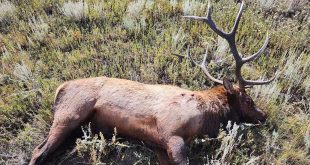Washington State Hunters Win A Small Battle
By Brian Clintworth
Longtime Eastmans blog readers might recall the name Lorna Smith, a new commissioner to WDFW. She was a key player in getting spring bear hunting shut down and this past winter presented a radical new way of Game Management in Washington state. She clearly has her mind made up regardless of what the science says and has made herself the enemy of the hunters in Washington based on her short term on the commission.
I’ve written numerous times in this column about the need for hunters to get involved. Thankfully some have and took up their concerns with a national sportsmen’s foundation, Sportsmen’s Alliance Foundation, and brought a lawsuit against commissioner Smith as she was in violation of state law.
Washington has a state law that prohibits commissioners from serving on a citizen body overseeing WDFW at the same time as another “county appointed office.” Essentially her entire term with the WDFW has been illegal and in violation of the Fish and Wildlife appointment statute. Lorna Smith was serving on a county commissioners office at the time that she was appointed to the WDFW commission.
The judge made this ruling in late June but did not make a ruling on the appropriate remedy for the situation. So sportsmen are left to see if she will be removed from the WDFW commission or simply resign from her other position. The best case would be if the judge would require her to resign from the WDFW commission.
The current commission continues to press on wanting to adopt a new Conservation Policy that marks a significant change in the direction and mission of the WDFW. Given the makeup of the commission, it is no surprise that hunters have read it with a healthy degree of skepticism. As the commission looks to significantly change how things have been done in the State we can only expect more courtroom battles to take place.
The war is definitely on against hunting in Washington state and all hunters need to seek to get more involved in their states. Opportunities throughout the west are dwindling as game populations shrink and as more people move into areas that may not have the same hunting heritage as the 2nd and 3rd generations that have lived in the Rocky Mountain region.
 Eastmans' Official Blog | Mule Deer, Antelope, Elk Hunting and Bowhunting Magazine | Eastmans' Hunting Journals
Eastmans' Official Blog | Mule Deer, Antelope, Elk Hunting and Bowhunting Magazine | Eastmans' Hunting Journals




